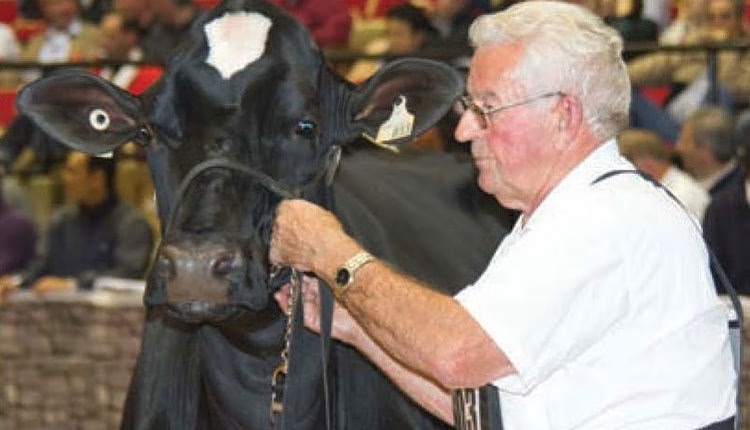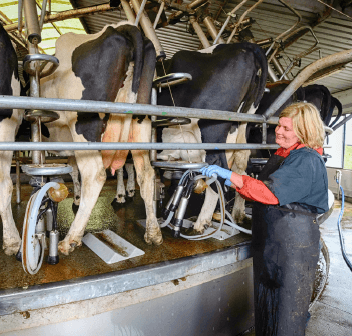Why do dairy cattle exhibitors wear white? Uncover the fascinating history and reasons behind this tradition.
Have you ever pondered the historical significance of dairy farmers donning white attire at cow fairs? With its roots stretching back over a century, this practice holds a profound significance beyond mere aesthetics. Understanding these historical underpinnings can offer a deeper connection to the enduring traditions that have shaped the dairy sector we know today.

We’ve been discussing it a lot lately, especially since some women opted to wear black to the Swiss Expo, and social media went wild. The Quebec Holstein Association then tried it in their spring show, with some exhibitors finding it a refreshing change while others felt it deviated from tradition.
Join us as we explore this easy clothing decision’s rich history and unexpected motivations, such as the symbolism of purity and the practicality of maintaining cleanliness. By the conclusion of this piece, you may see that clean white outfit in a whole new light.

From Cleanliness to Tradition: The Century-Long Legacy of Dairy Exhibitors Wearing White, a practice that has significantly shaped the dairy industry.
Wearing white in dairy cow exhibits dates back over a century. This legacy reflects the dairy industry’s commitment to cleanliness and professionalism, bolstering public faith in milk and dairy products.
One crucial individual is William Dempster Hoard, the publisher of Hoard’s Dairyman, a reputable dairy business newspaper founded in the late 1800s. Hoard intensely fought for cleanliness and excellent dairy farming standards, laying the groundwork for a common show practice.

The method acquired more traction in the early twentieth century. As technology, such as vacuum systems and other milking technologies, started to change dairy production, the significance of cleanliness became even more vital. Exhibitors wearing white become symbolic representations of these high standards.
The inaugural National Dairy Show in Chicago in 1906 also significantly impacted. This event brought together dairy producers nationwide to showcase best practices and establish rules, including the use of white clothes for exhibitors. This marked a turning point in adopting the tradition across the country.
This tradition has stood the test of time, representing the professionalism and precise care that have come to define the dairy sector. Understanding this rich history helps to explain why dairy cow exhibitors wear white, not only as a uniform but as a lasting emblem of commitment to quality and excellence.
Let’s Talk About Practical Reasons Behind This Long-Standing Tradition
Let’s delve into the practical reasons behind this enduring tradition. Why do dairy cattle exhibitors opt for white? It’s not just for the visual appeal. The choice of white clothing serves a practical purpose: it makes it easier to spot dirt and contaminants. Imagine spending a day with animals; it’s a messy job. The white fabric quickly reveals filth, enabling staff to address cleaning issues promptly. This vigilance is crucial as it ensures optimal hygiene and guards against infections.

“Wearing white helps us maintain the highest standards of cleanliness,” the legendary showman Bert Stewart once told me. His sentiment is shared across the business. This practice demonstrates a farmer’s devotion to quality and cleanliness. No farmer wants to display an animal that does not seem beautiful; the same is true for their wardrobe.
The choice of white apparel is a practical and symbolic expression of our commitment to keeping an immaculate atmosphere. When you see a dairy exhibitor dressed in white, you’re seeing more than just tradition; it’s a monument to their devotion to producing high-quality milk and safeguarding the health of their animals.

Why White? Discover the Symbolism and Dedication in Dairy Exhibitors’ Attire
When you see the striking white attire, you might wonder if there’s more to it than meets the eye. And you’d be right. White clothing is not just functional; it carries significant symbolic meaning. White has long been associated with purity and quality, values that dairy producers hold dear. It’s a color that signifies a commitment to high standards, not just in the appearance of the cow but also in the cleanliness and quality of the dairy products themselves.
The farmers’ commitment to their profession and animals is also reflected in the color white. Wearing clean white attire shows great care and regard for the livestock. These farmers do more than handle livestock; they also nurture them, keeping them healthy and stress-free. This passion is evident to everybody who passes through the display rooms and observes farmers engaging with their well-groomed livestock. It is an unsaid assurance to spectators and judges that everything about their organization is top-notch.
The custom of wearing white varies somewhat based on geography and cultural background. Farmers, for example, may stick to pure white in certain places but use cream or off-white in others. Regardless of the variances, the core stays the same: a display of purity, quality, and steadfast commitment to perfection.
Modern Evolution: Adapting Tradition with Contemporary Touches
Fast forward to now, and you will see that the custom of dairy exhibitors wearing white has changed dramatically. While the fundamental causes remain firmly ingrained in history, current procedures have evolved to accommodate new materials and styles. For example, exhibitors today often choose long-lasting, stain-resistant materials that can withstand the rigors of a fair or show, making them more straightforward to clean and maintain. Modern textiles, such as polyester mixes, have replaced pure cotton uniforms from the past, blending history and utility.
But how can contemporary farmers mix tradition and practicality? It’s simple—they innovate while remaining true to their heritage. Today’s clothing often incorporates innovative cuts and patterns that increase mobility and comfort without abandoning the traditional white appearance. Some farmers even use breathable clothes or moisture-wicking technologies to keep them comfortable while working long hours at exhibitions.
Surprisingly, this custom is still alive. According to a recent poll, 90% of dairy producers still wear white at cow exhibitions, with just a few countries, like France, not following this guideline. This displays a strong regard for conventions handed down through generations, even as they accept new techniques and technology. Adherence to this custom demonstrates a community spirit and shared identity among dairy farmers, establishing a connection between the past and the present.

Pride in White: A Symbol of Tradition and Dedication in Dairy Farming
Ask any dairy farmer, and they’ll tell you that wearing white for displays gives them genuine pride. This legacy is more than aesthetics; it is firmly anchored in community and shared ideals.
“It’s about not only tradition but also upholding standards,” Mary-Eve, a seasoned dairy showman, tells me.
“It not only looks classy, but we are telling the world we are serious about what we do,” says Alexa, a brilliant young performer.
These testimonies and social media trends show the centuries-old tradition’s ability to build a feeling of community and belonging. Wearing white is more than a clothing rule; it is a mark of pride in the dairy-producing community.
The Hunt for White Apparel: Challenges and Triumphs
Finding white pants is not as easy as walking into any clothes shop. If you’re a dairy farmer, you’ll understand how difficult it is to find long-lasting, well-fitting white trousers in shops or online. Is it just me, or does it seem like a hunt every time?
Even when you’ve found the right pair, the next big problem is keeping them clean. When your everyday surroundings include mud, feed, and animal droppings, it almost seems like a magic trick to retain that spotless white. Regardless of how often you wash them, stains resist all detergents and elbow grease. It looks like one stride forward, two steps back.
It’s pretty odd, given that white was selected to represent cleanliness and professionalism. Keeping those whites pristine requires dedication and patience, which may be stressful. “It’s like maintaining a white picket fence in a dust storm,” explains Mellisa, a mother of three aspiring entertainers from Wisconsin. However, the continual struggle is worthwhile for many since it demonstrates their commitment to preserving tradition and quality in dairy production. Each stain you successfully remove may be seen as a tiny win, demonstrating your unshakable dedication to your trade.
The Bottom Line
The custom of dairy cow exhibitors wearing white extends well beyond aesthetics. It is based on a dedication to cleanliness and a long-standing history. The motivations for wearing white range from displaying pride and professionalism to achieving practical advantages such as early detection of health conditions. This combination of heritage and contemporary adaption represents the changing nature of dairy farming, emphasizing the devotion and enthusiasm of individuals who wear the uniform. So, the next time you see a dairy exhibitor wearing white, you’ll know it’s more than simply a uniform—it’s a badge of pride. How will you continue to sustain and develop agricultural traditions?
Summary:
Have you ever wondered why dairy cattle exhibitors are always dressed in white? This article dives deep into the rich history and practical reasons behind this iconic choice of attire. From cleanliness and tradition to symbolism and practicality, we explore every aspect to understand why white clothing has become synonymous with dairy farming. You’ll discover surprising facts, historical insights, and modern adaptations that keep this tradition alive and relevant today. Dairy farmers at cow fairs traditionally wear white clothing, a practice dating back over a century. This practice reflects the dairy industry’s commitment to cleanliness and professionalism, bolstering public faith in milk and dairy products. William Dempster Hoard, publisher of Hoard’s Dairyman, played a crucial role in laying the groundwork for this practice. The method gained traction in the early twentieth century as technology like vacuum systems changed dairy production. The inaugural National Dairy Show in Chicago in 1906 significantly impacted the practice, bringing together dairy producers nationwide to showcase best practices and establish rules, including using white clothes for exhibitors. A recent poll showed that 90% of dairy producers still wear white at cow exhibitions. So, what does it take to don the pristine white and proudly represent the dairy industry? Keep reading to find out.
- White clothing for dairy exhibitors is a tradition dating back over a century, symbolizing cleanliness and professionalism.
- William Dempster Hoard, publisher of Hoard’s Dairyman, was instrumental in establishing this practice.
- The practice gained prominence in the early 20th century alongside advances in dairy technology, such as vacuum systems.
- The National Dairy Show in 1906 played a significant role in standardizing the use of white attire for exhibitors.
- A recent poll indicates that 90% of dairy producers continue to wear white at cow exhibitions, demonstrating its enduring relevance.














